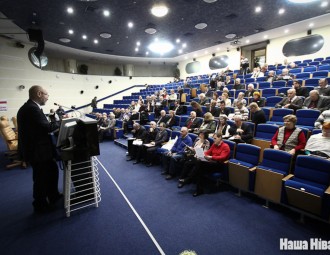Alena Anisim: The Congress demonstrated that dialog is possible in the society

The Congress for Independence might assemble in order to support someone from the candidates, but for now this question isn’t high on the agenda.
On June 7 political session of the Congress for Independence took place in Minsk. Its results in the interview with the “EuroBelarus” Information Service drew Alena Anisim, Coordinator of the organizing committee and potential presidential candidate.
- Did the Congress for Independence elaborate some concrete strategy of further actions of sovereign forces?
- The Rada of the Congress started an open discussion with attraction of all interested in order to fill the notion of “the country’s independence” with some concrete meaning. During the economic session we looked into what an economic factor of independence is; during the political session we talked about the steps we need to take in order to strengthen our independence. In autumn we will prepare and hold civil hearings about the reformation of the national education system and about the establishment of the National University. And later we will discuss the problem with mass media and freedom of press in Belarus.
The process doesn’t merely go as our theoretical considerations, but as a civic discussion for today’s authorities to hear the voice of the society.
- Political session of the Congress for Independence gathered a surprisingly diverse public: from the Liberal Democratic Party (LDP) to the “Movement for Statehood and Sovereignty of Belarus”. Did the participants of the Congress find ground for cooperation?
- Representatives of different political trends were present at the meeting, so critical remarks did take place. However, one thing is to talk about the need of dialog, whereas it is a different thing to start it. We lost the culture of political discussion – we have to start everything anew. The Congress demonstrated that dialog is possible in the society, likewise it is possible to organize dialog with authorities. I believe this to be the main result of the Congress.
- Uladzimir Niakliaeu offered the Congress for Independence to become a part of his movement “For independence and statehood of Belarus”. How did the Congress react to that offer?
- If Uladzimir Niakliaeu really wanted to make something in practice, he should have talked to Rada first. But there was no talk beforehand; he has just presented us with a fait accompli. This offer, likewise any other, demands former discussion. This issue wasn’t on our agenda, so we didn’t find it necessary to discuss it. We might discuss Niakliaeu’s offer at the Rada, but we need to assemble Rada, invite Niakliaeu, and talk about his vision of this assembly. We don’t know anything about whether the movement has to be structured somehow or whether it should be registered. So to make loud statements without further action is not our approach.
- You say that this autumn the Congress on problems of education and mass media will continue. However, there is no time for that: on November 15 the “elections” are most likely to happen…
- Life doesn’t remain the same and isn’t confined to campaigns. The main point of the Congress is to give our society a chance to product ideas, well-thought decisions, and its vision of where we should go and offer them, to all potential candidates as well.
- How the Congress is going to determine the format of its participation in the presidential campaign?
- The Congress didn’t aim at nominating its candidate to the presidential post since its start. The Congress namely gathered for uniting as much people as possible in support of the country’s independence.
Perhaps, the Congress might be gathered in order to support someone from the candidates, but for now this issue isn’t on the agenda. Candidates are nominated by political or civil forces, as is provided for by the law.
-
03.01
-
07.10
-
22.09
-
17.08
-
12.08
-
30.09



























